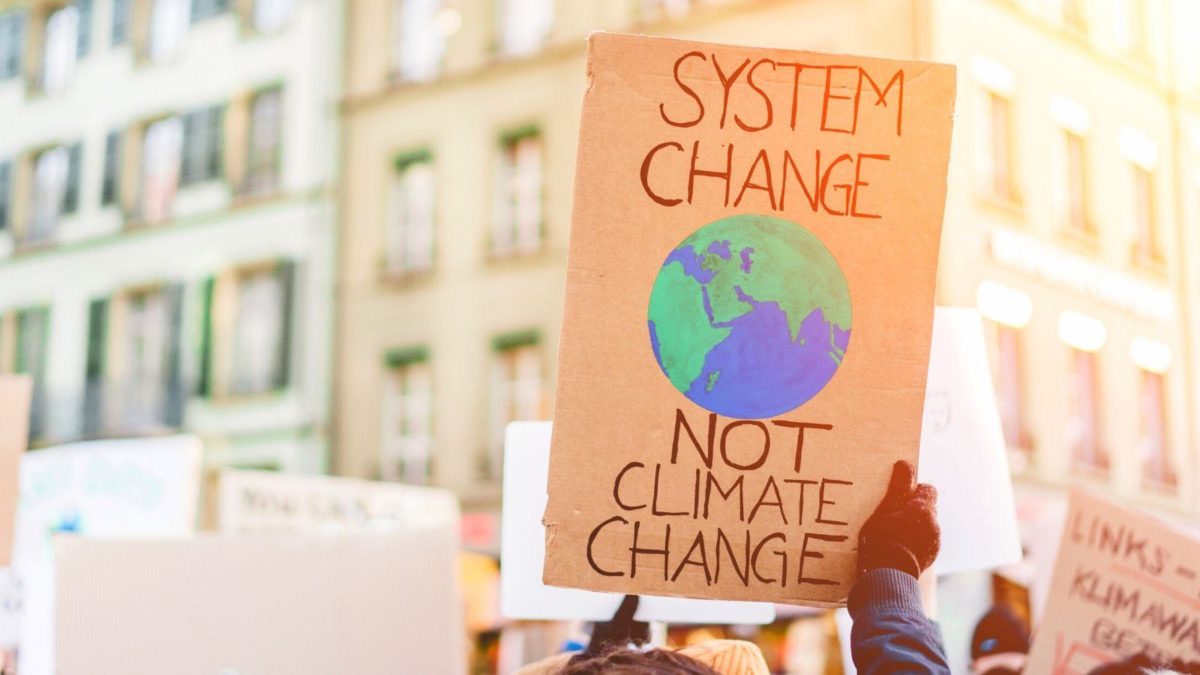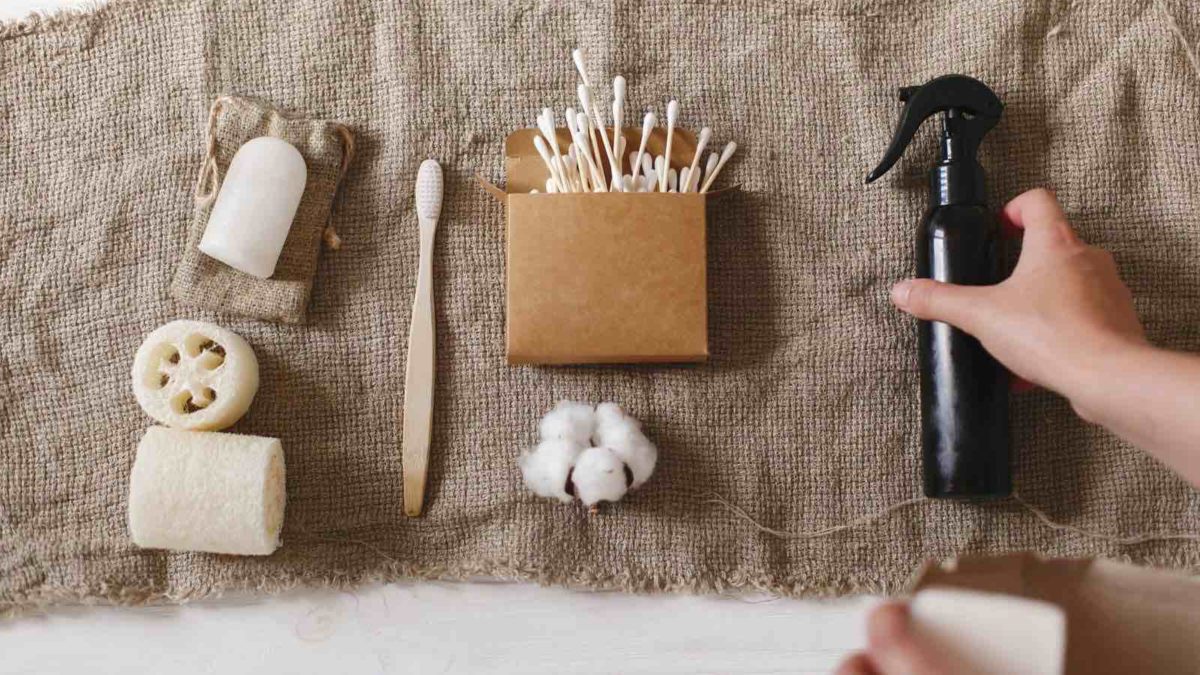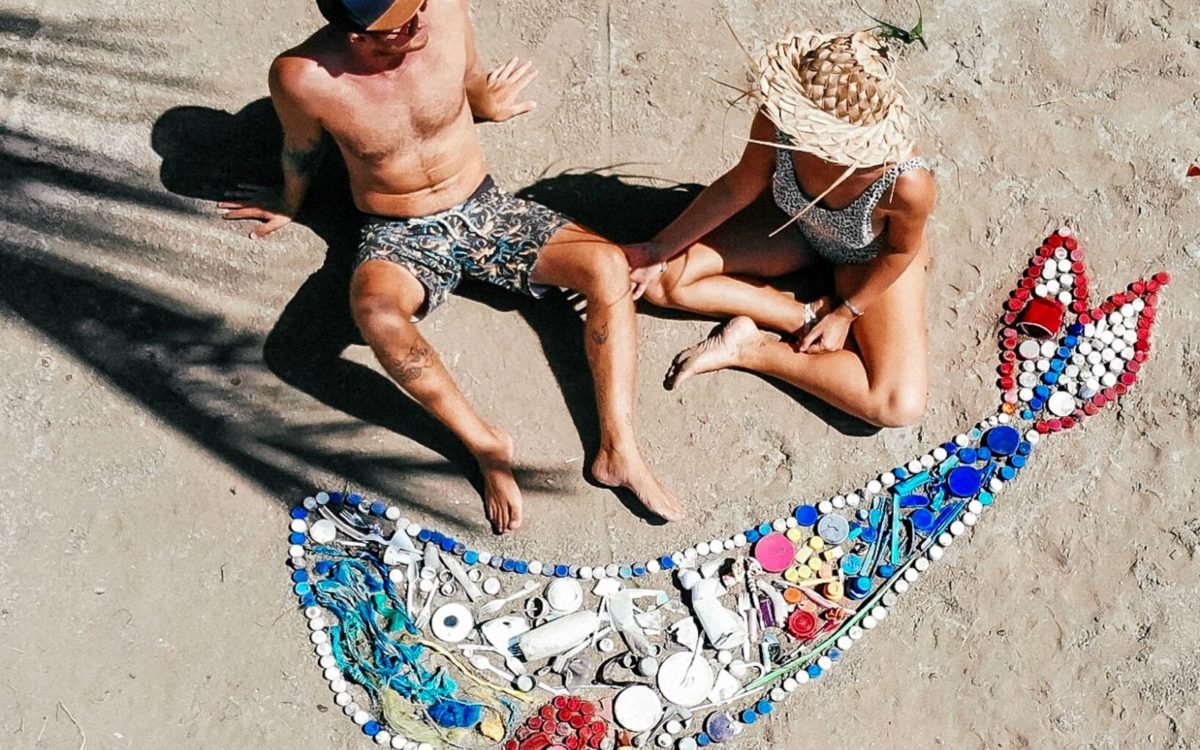There has never been a greater need for alternatives to plastic bags. Or any kind of plastic alternative. Plastic is crippling our environmental stability and seriously threatening the lives of both plant and animal species on our planet (humans included). We really want to say no to plastic whenever we can.
Finding the right alternatives to plastic bags can be tough. Especially ones that:
- suit your life
- are affordable
- practical
- and environmentally friendly
Rest assured, after reading this, you will feel comfortable using and discussing alternatives to plastic bags for at home and about.
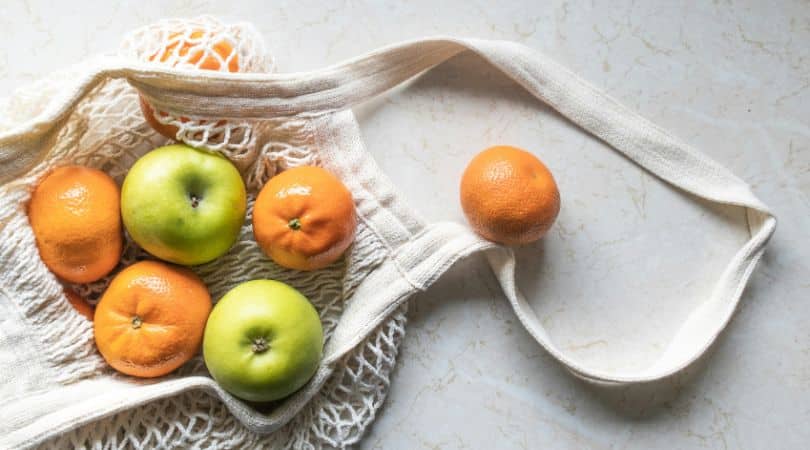
Table of Contents
Alternatives To Plastic Bags At Home
Let’s say you want to start from scratch. A new year, a new you. You want a set of alternatives to plastic bags for your daily life. You want to say no to plastic for good! There are several alternatives to plastic bags that could suit. However, there really isn’t a “one size fits all” solution. Depending on your task/objective/need/desired look there may be a few different options for you.
In this section, we will review the potential products existing as alternatives to plastic bags. In this case, we are talking about single-use plastic bags (typical grocery bags). Some products may be made from plastic, however, are designed for multiple uses and specifically for reuse. It’s actually this reusing that is doing the greatest environmental good. It’s easy to eco shop if you know what you’re looking for.
Alternatives To Plastic Bags For Food Storage
If you normally use plastic bags for food storage (standard zip lock bags), there are a few alternatives to plastic bags out there that you can easily switch to.
Silicone Bags
- Silicone is made from sand, whereas plastic is made from petroleum.
- It’s BPA and other harsh chemical-free
- The bags are self-sealing so are a great alternative for plastic ziplock freezer bags
- It can be used in the freezer, microwave or even thrown in the dishwasher
- They can be used over and over again and will not absorb smells of food
- They’re made under good and responsible practices
- There are different sizes and colors if you want to coordinate your fridge/cupboard/lunch bags/etc.
Purchase Stasher Bags on Amazon
Extra large silicone bags
- These bags are up to 1 liter so have more volume that the Stasher
- They’re also good for the microwave, dishwasher, freezer too!
- These are good as an alternative to plastic ziplock bags
- Good alternative to plastic bags for liquid or meat
Purchase a Homelux Theory bag on Amazon
Wrap your food in beeswax wrap
- It’s a much more natural product
- The beeswax is mixed into organic cotton with natural oils
- It provides a sealed wrap perfect for saving or storing food
- The wraps themselves can last up to a year
- They can be washed with cold soapy water and air-dried
- A variety of patterns/colours for coordinated storage
- A variety of sizes available
- Good alternative to plastic sandwich bags and plastic wrap
Purchase Bees Wax Wrap on Amazon
Store Your Food In Glass/Stainless Steel Containers
- A variety of sizes available
- Easy to clean
- They look great
- Stack and stores well in a fridge or cupboard
- Good alternative to plastic bags for liquids and meats
Purchase Glass & Stainless steel Containers on Amazon
Reuse whatever you have
Let’s face it. No one is going to judge you on how you store food in your cupboard or fridge. If you can:
- Save money
- Save the environment
Using whatever containers you have as alternatives to plastic bags, will also work. It helps to reduce the demand for new products and hence the environmental impact is lower. They can look good too. Our favourite is reusing old pasta sauce jars.
Alternatives To Plastic Bags For Garbage/Trash Bins
As plastic bag bans increase there are fewer chances to reuse your plastic bags to line rubbish bins. So, do you buy new plastic bags to line your bin? Isn’t that defeating the whole purpose?
You do not have to line your rubbish bins with plastic bags. This is generally done to reduce the mess made in the bin itself. Here are some plastic bag alternatives for your garbage bins.
Think of garbage bins as wastebaskets. Not something you need to keep spotless. Use them like they’re going to get dirty. Because even when you line it with a plastic bag, inevitably something spills and you need to clean the bin out anyway.
A new system for your kitchen waste
- Prepare food (ideally using fresh produce from markets that have not come wrapped in plastic)
- If you do have packaging, give your items a quick rinse (bottles, jars, plastic bags, etc.)
- Either (A) – reuse the packaging for future storage of food, screws, nails, whatever. Or (B) place the packaging into your recycle bin
- Separate any plastic bags as they need to be recycled at a supermarket
- When done preparing food, place organic waste into your Kitchen Compost Bin.
- When cleaning the kitchen, take your compost bin a) to your garden, and bury the organic waste, b) to an outdoor compost bin, c) into your curbside bin if you don’t have anywhere to compost.
- As needed, rinse out the curbside bin. Throw in some vinegar to help reduce odour.
Place your food scraps in a Kitchen Compost Bin
Why?
- It sits on your kitchen benchtop and takes up hardly any space
- They have a charcoal layer built into the lid to absorb odors, so food waste will not stink
- They’re easy to clean after dumping out the waste
- Different colours to suit any kitchen
- Saves all those plastic garbage bags you would normally use on a daily basis!
Purchase a Kitchen Compost Bin on Amazon
Line Your Bin With Newspaper
If you don’t want to use the compost bin for your organic waste and want to throw everything into one bin, you can use newspaper to line the bin. It will help absorb most of the mess.
Here is a short video on how to fold newspaper to make a bin liner! It’s actually pretty simple. There seems to be an endless supply of newspapers in circulation. This is one way to get the most out of them.
Use Reusable Trash Bags
Reusable trash bags are great as they can be used over and over, and can be machine washed.
Bagito has reusable trash bags made from rPETe material that can be machine washed. They are water-resistant and durable so they won’t break down with your household waste. Coming in three different sizes, you can use them in your bathroom, kitchen and outdoor bins.
K.A.N bags are made out of recycled canvas making them extremely durable. They can hold approximately 40 pounds and are great for the kitchen, bathroom, camping, outdoor cleanups and more.
Purchase reusable trash bags on Amazon
Alternatives To Plastic Bags For Out And About
Grocery shopping is inevitable. Thanks to some great political changes, the single-use plastic bag is becoming a thing of the past. If not banned yet where you are, there is likely some kind of additional charge.
So, what are the best alternatives to plastic bags?
A bag is a bag, right? It depends on how you like to shop. Here are a few of our favourite alternatives to plastic bags for shopping and groceries:
Fold Up Bags
- They actually “fold up”! So they take up hardly any space in your handbag/pocket when you are walking to the shop
- They are lightweight yet heavy duty
- They last a long time
- Have various colours to choose from to match your “look”
- Great environmental choice over single use plastic bags!
Purchase fold up bags on Amazon
Cotton Tote Bags
Cotton bags are a great alternative to plastic bags if you are going to reuse them. Like all bag alternative options, reusing is the key!
- Cotton bags can be reused over and over!
- They look great
- Great alternative to plastic shopping bags
- Can be washed if needed
Purchase a cotton tote bag on Amazon
Cotton Mesh Bag
- The mesh folds up smaller than the cotton bags! (Less space mean travel friendly)
- They can be washed
- Look great
- Great alternative for plastic grocery bags
Purchase a cotton mesh bag on Amazon
Woven Basket
If you’re not worried about space like I am, a basket is a great choice for your plastic bag alternative. It can be used over and over again and looks cool. When you’re shopping you can put your items straight into the basket and take them out again at the checkout.
- This one is made from woven seagrass!
- It looks great
- Can carry all of your groceries in one
- Can be used for multiple events (shopping, beach days, picnics, travel, etc.)
- Great alternative to plastic shopping bags
Purchase a woven basket on Amazon
Reusable Mesh Produce Bags
These mesh produce bags are perfect for bulk food, like loose beans, nuts etc. Or your salad items like spinach leaves and tomatoes.
- It saves using plastic carry bags from the reel
- They can be washed
- Great for bulk buy items
- Lightweight
Purchase reusable mesh produce bags on Amazon
Cotton Muslin, Mesh, and Swaddle Bags
- They can be used as grocery bags, produce bags, beach bags, and toy bags.
- Made out of Organic Cotton Knit Fabric, certified according to Global Organic Textile Standards (GOTS)
- It can be machine washed, and the mesh fabric drys easily.
Purchase produce bags on Amazon
The Swag Produce Bag
- These bags can keep fruits and vegetables fresh for longer
- Is machine washable and will last for years
- made from 100% unseeded cotton using a patented three ayer design that slow ripening, encourages air flow and promotes hydration.
Purchase The Swag Produce bag on Amazon
Alternatives To Plastic Bags For Commercial Use
It seems like there is no end to the use of plastic bags for commercial use. When you walk down a grocery aisle and look at the shelves, everything seems to come in plastic.
Can it change?
Yes. Of course. You only have to look back 50 years ago when grocery stores operated without plastic bags. When every shop was a Zero Waste Shop! There was no need to say no to plastic as it simply wasn’t an option.
While the industry produces items in plastic for us to buy, they are not the only ones to blame. We, the consumers, need to rethink our ways. We need to CHOOSE alternatives to plastic bags.
As the world moves forward, our time spent on food preparation has changed. No longer do people spend hours making their own pasta. A packet of pasta can be purchased at the store. It can come from another part of the world, conveniently sealed in plastic (in case it does not sell for months or years).
Imagine if the world just decided not to buy pasta anymore. We all just made it ourselves. There’d be no demand for packet pasta and therefore companies would stop making it (and wrapping it in plastic). Pasta is just one example. But you get the idea.
Try making your own snacks, instead of buying plastic wrapped store ones. Here are some ideas. Alternatively, shop more at bulk food stores and market stalls where you can bring your own produce bags to fill.
Alternatives To Plastic Bags For Retail
Retailers need to make a shift from plastic bags to environmentally friendly and reusable alternatives. There are different ways to do this:
- Provide no bag and ask consumers to use and bring their own (a great incentive is to give a slight discount on products bought)
- Provide alternative bags at no extra cost to the consumer (e.g. light-weight synthetic fabric bags, paper bags, or cotton/canvas bags)
- Offer reusable bags for sale (e.g. light-weight synthetic fabric bags, paper bags, or cotton/canvas bags)
Ireland famously introduce the plastic bag ban in 2002 and saw a massive 90% reduction in bag use and litter. We CAN live without plastic bags, it just takes a bit more effort. Both from us, the consumer, and the commercial industry. The bag bans and taxes are significantly reducing the demand for plastic bags in circulation. This is giving way for alternatives to plastic bags that can be reused over and over again!
Eliminating the single use mentality will be the game-changer in the world of plastic bags (and plastic in general).
What Is A Plastic Bag?
Plastics are produced from the waste products of oil refining. The plastic bags we deal with on a daily basis (grocery bags/retail bags/food packaging bags) are either High Density Polyethylene (HDPE) or Low Density Polyethylene (LDPE). These are made from the petrochemical process (fossil fuels/oil).
These plastics were first developed in the 1950’s.
How the Petroleum industry influenced the plastic bag industry
It wasn’t until the 1960s when a Swedish company called Celloplast patented their idea of the “T Shirt plastic bag” (typical grocery bag) in the USA that things became serious. Plastic bags are made from fossil fuels. The petrochemical company, Mobil (ExxonMobil), became increasingly interested in the technology.
“From the 1960s on, Mobil pursued an aggressive policy on polyethylene packaging patents and by 1977 was producing its own bags.”
Following the development of the Society of Plastic Engineers in 1985, a large push began to eradicate paper bags from grocery stores.
“The last stronghold is the grocery sack bag,” a Mobil executive told the Los Angeles Times, “and now we are going after that.”
Within the decade plastic bags were used in 80% of grocery store purchases in the USA. The rest of the world was not far behind.
The cost of a plastic bag
“The economic advantage of plastic bags over paper bags has become too significant for store owners to ignore. It costs one cent for a standard plastic grocery sack, whereas a paper bag costs four cents” Robert Bateman, president of Roplast Industries, a manufacturer of plastic bags—including reusable ones.
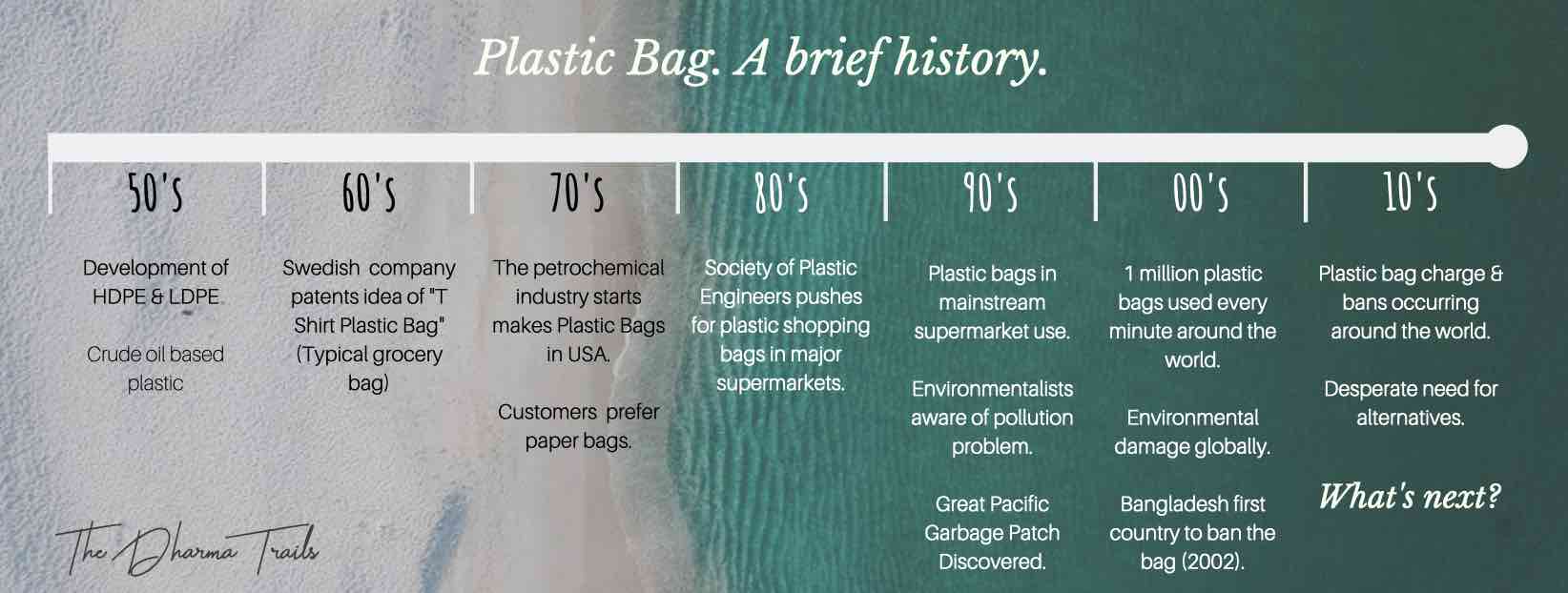
The Need For Alternatives To Plastic Bags
Due to their lightweight nature, plastic bags can easily blow for miles without being caught or noticed. They inevitably end up in places they shouldn’t. This often results in plant/animal entanglement or ingestion, which often leads to severe sickness or death.
Plastic being harmful to our environment is not a new concept. A push for eliminating plastic bags began as early as the 1990s. That’s right, people have been pushing for alternatives to plastic bags for the last 30 years!
But it wasn’t until the sailing researcher, Charles Moore passed through the North Pacific Gyre in 1997 (now called the Great Pacific Garbage Patch) that the scale of the issue became apparent. Even more recently (March 2019), a whale washed up on the beach of the Philippines with 40kg (88 pounds) of plastic bags in its stomach. Plastic waste is making its way into the environment and the animal kingdom.
Environmental Effects Of Plastic Bags Today
It has been estimated that somewhere between 500 billion and a trillion plastic bags are consumed worldwide each year. With only about 80% of trash in the USA ending up in landfills. The rest of it ends up somewhere unwanted.
Is there anyone pro plastic bag?
Lobbyists with the backing of such organisations as the American Chemistry Council (made up of you guessed it, ExxonMobil & Dow Chemical) with more than USD$120 million in annual revenues are pushing to keep plastic bags in circulation.
There has been various studies done about the environmental benefit of using plastic bags (HDPE & LDPE) over various alternatives (paper bags, cotton, etc.). We will get into those in a minute.
The Need To Reduce All Single Use Plastic Items
While plastic bags are targeted in the media, they are by no means the only plastic product negatively influencing our environment.
All single use plastics are adding to the ever-increasing plastic pressure.
There are more and more viable alternatives to single use plastic products available as the world changes its view on our “throw away” mentality. However, these are yet to become mainstream. Alternatives to plastic bags need to become the social norm and way of life.
Are There Alternatives To Plastic Bags?
There is. But, it’s not as easy as simply saying, “yes, this is the best one”. While there are already many products existing as direct alternatives to plastic bags, they are not necessarily better.
Creating any product uses resources:
- natural resources,
- fuel,
- energy,
- waste product,
- water resources,
- time,
- money,
- transportation,
- material availability
- workers (with ethical pay & treatment)
These are just some of the “ingredients” that go into creating a product on a mass scale. Whether a company is creating plastic bags or alternatives to plastic bags, there are still resources that need to be used.
Just because things are made cheaper or from an organic material does not necessarily mean that they are “better” (we know this from the fast fashion industry. As a result, fashion products are becoming more sustainable and commercially transparent – understanding the ethics behind the brands)

Plastic vs Paper Bags
It might seem like going back to paper is the most logical. And from a litter perspective, it’s a no-brainer. It is one of the alternatives to plastic bags.
Unfortunately, due to the “ingredients” associated with mass production (as mentioned above). It’s not quite as simple to call it the “best”. There have been various studies done on this very comparison. Most of which give the kind of results you don’t want to hear.
The main studies that seemed to reference online were done between 2005 and 2011. In most cases the studies argue the following:
PRO PLASTIC
- Plastic uses up less space in landfills
- Plastic uses less natural resources to make
- Nothing really degrades in a landfill anyway
ANTI PAPER
- Uses more water to produce than plastic
- Requires greater transportation (therefore produces greater CO2 emissions per bag)
- Produces more solid waste than plastic
The arguments are fairly one-sided. And with reports (one in 2007) potentially paid for by US Plastic Bag manufacturers it’s hard to know the real extent of the study’s purpose. Having mainstream, available alternatives to plastic bags would disrupt the oil industry sales.
As a counter argument to the above mentioned study results:
- I know that I can crunch up a paper bag to about the same size as a plastic bag with my hand (therefore does paper really take up more space?)
- Water can be treated and reused in paper production. (Therefore it shouldn’t use “more water to make paper than plastic”)
- Advancements in electronic vehicles are reducing CO2 emissions (in some cases by half or more). (Therefore transport of the bags should not be a deciding factor).
On top of that, paper bags are not causing mass litter piles that float in our seas. So, which one is better?
“Faced with the question of paper or plastic, the answer should always be neither,” says Reuseit.com
If you look at the solution as either paper or plastic, the single use mentality goes on. We need to train ourselves to “use smarter”. We’ll get to that shortly. While there are many alternatives to plastic bags, we need to be looking at smarter options.
Are Compostable Or Biodegradable Bags Good Alternatives To Plastic Bags?
Reviewing each bang type (compostable, degradable, biodegradable) in a recycling sense.
From the standpoint of decomposing in a landfill or the ocean. These bag types are not really any “better” than “normal” plastic bags.
IN A LANDFILL
Like paper bags, once anything gets covered under huge volumes of additional waste. It loses the ability to “break down/degrade” over time without exposure to oxygen.
IN THE OCEAN
Biodegradable or compostable bags will not break down in the sea.
The term compostable is referred to “home composting“. This means if you have a small compost bin at home at have it exposed to UV and keep it at over 50 degrees C (122 F) the bags will breakdown over the course of 10-45 days (depending on the bag)
From a litter perspective – compostable or biodegradable are not alternatives to plastic bags
The issue is not what the bags are made of so much as how often they are used (most are single use). The idea of single use needs to end.
Best alternatives to plastic bag for the environment
Studies over the years have compared various alternatives to plastic bags (paper and cloth bags). The objective of these studies was to quantify the “best bag” from an environmental standpoint.
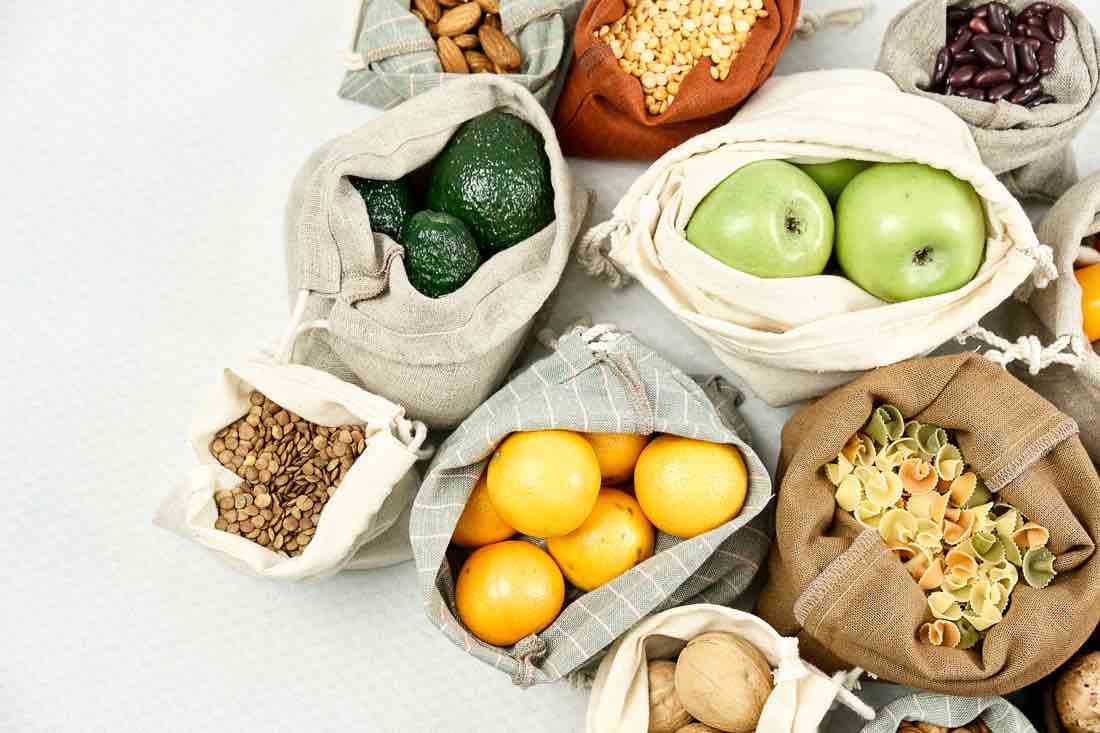
Glazunoff – stock.adobe.com
Four main categories are used to compare:
- Decomposition – how well the bag breaks down (landfill)
- Manufacturing Process – what kind of process/materials/waste is required to make the bag
- Reusability – the bag’s effectiveness to be reused
- Recyclability – the costs and processes associated with recycling the material into a new bag
The results lean heavily towards plastic bags as being the best environmental product.
How could this be? A study done by Carrefour in 2004 (the global chain of supermarkets [which uses plastic bags]) is referenced a lot. It compares plastic, paper & biodegradeable plastic bags. The report states that paper bags are worse for the environment than plastic or cotton bags.
This is based on a couple of main points of which were summarised in the PAPER VS PLASTIC bag argument section.
A study that included the real impact of litter might help clear things up.
While there is mention of litter in another comparison, its real impact is not fairly weighted against that of other potential bag materials.
If we assume that all bags are disposed of properly (including high levels of plastic recycling) then plastic might just be better for our environment. However, until that point, the effects of plastic on the environment are reaching catastrophic levels.
The best alternative for the environment is a reusable mentality
Reusing, proper disposal and recycling is really the best thing for the environment. Single use plastic (or any product) is the worst for the environment.
- If you’ve got plastic bags at home, keep some, reuse them when you shop.
- Dispose of the rest at a proper collection bin for recycling
- Let’s keep the demand for bags low so companies can stop making them!
- Education is key. Things like impactful images or slogans are great for reminding the world to care.
The best alternatives to plastic bags are the ones we don’t have to throw away. If you’re traveling, try to eco travel and save the need for single use bags (or any plastic items).

Cheapest Alternatives To Plastic Bags
The cheapest alternatives to plastic bags is no bag.
How does that work? Reusing what you have. Reducing the need to buy more. It might not look that nice to have a handful of crunched-up/used plastic bags when you go to the store. But, this will be cheaper than buying alternatives to plastic bags.
And, if you don’t litter (or throw out) those bags that you already have, that will actually be the best environmental choice.
The second cheapest is a reusable bag.
If you use a bag over and over again. You’re contributing to the reduction of consumer demand for the production of more bags. More bags means more resources and potentially more pollution potential. The kinds of alternatives to plastic bags that we should be targeting are reusable ones.
The future of plastic bags
The future is looking bright.
Alternatives to plastic bags are developing as we speak. Here are a few of the latest companies and products leading the way:
Cassava Bags
Cassava is a type of root vegetable. After rice and maze (corn), it is the third highest source of food carbohydrates in the tropics.
There are companies making bags that use Cassava as their base ingredient (as opposed to petroleum in standard plastic grocery bags).
The bags actually dissolve in water…check out the video here it’s crazy to see.
This is a massive step in the right direction!
Cellulose packaging
Cellulose is an organic compound found within the cell walls of plants and algae.
VTT Technical Research Centre of Finland has developed a packaging suitable for food storage that is completely biodegradable. It looks and feels like plastic, but it’s not.
What about all the plastic bags that are in circulation?
The Fungi Mutarium (Utrecht University) is working with a mushroom that can actually break down plastic bags. The mushroom can then even be eaten or used as a kind of natural fuel.
This is groundbreaking research with huge positive potential.
Can you recycle plastic bags?
In short, yes.
Currently, the amount of plastic bags that are recycled is very low:
- IN AUSTRALIA – only 3% of plastic bags are actually recycled.
- IN THE USA – only 1% of plastic bags are actually recycled.
But, the technology exists. Plastic bags can be recycled into more bags, furniture, toys, signs, you name it.
You can even recycle plastic bags at home. Find out how to recycle plastic bags at home here.
Got ideas on plastic bag alternatives? Want to share?
Pinterest is one of the greatest platforms for online sharing in the sustainable field.
Find ideas on sustainable alternatives from other like-minded people from around the world!
Join a Pinterest Sustainable Group Board today! Here are the best sustainable boards and groups on Pinterest at the moment! Or learn how to create your own Pinterest Eco Group.
The eco travel movement is gaining more and more traction and great alternatives to single use plastic items are becoming more accessible. Learn more about eco travel here.
Like This Article? Pin it!
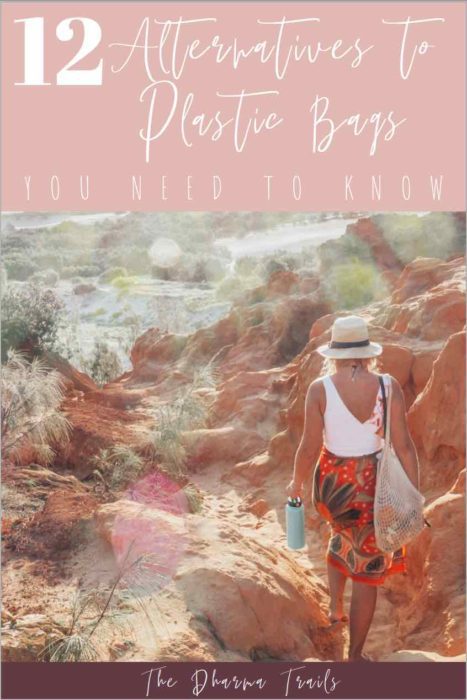
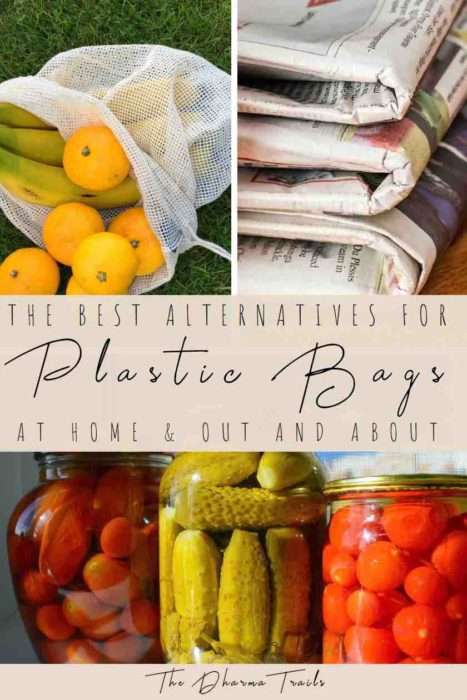
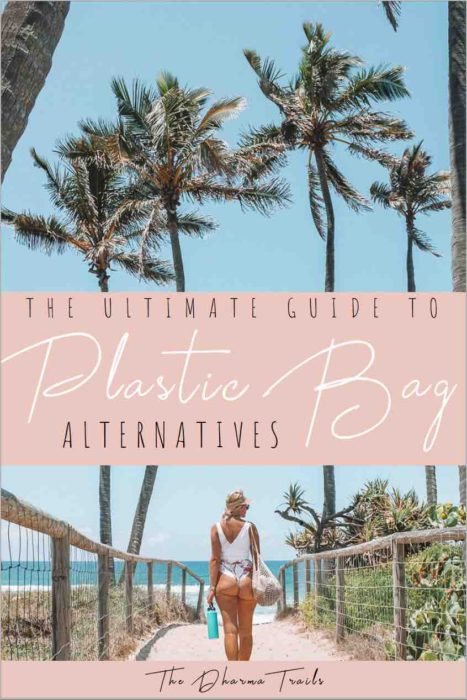
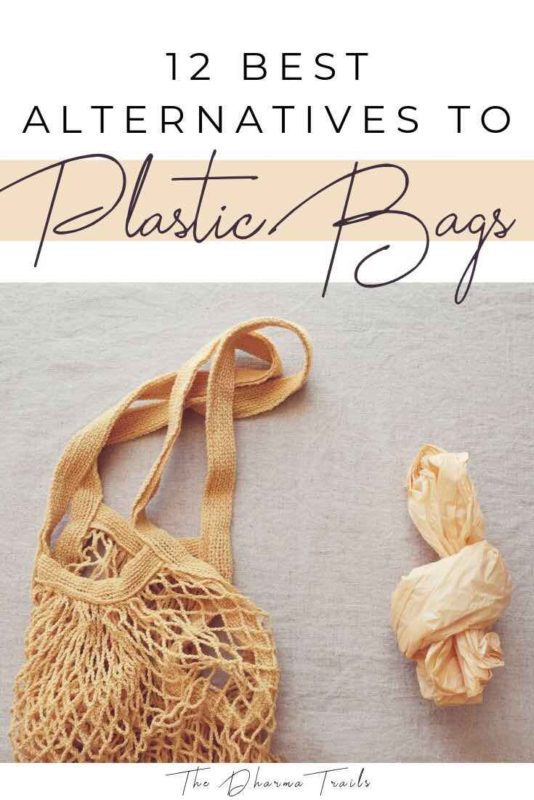
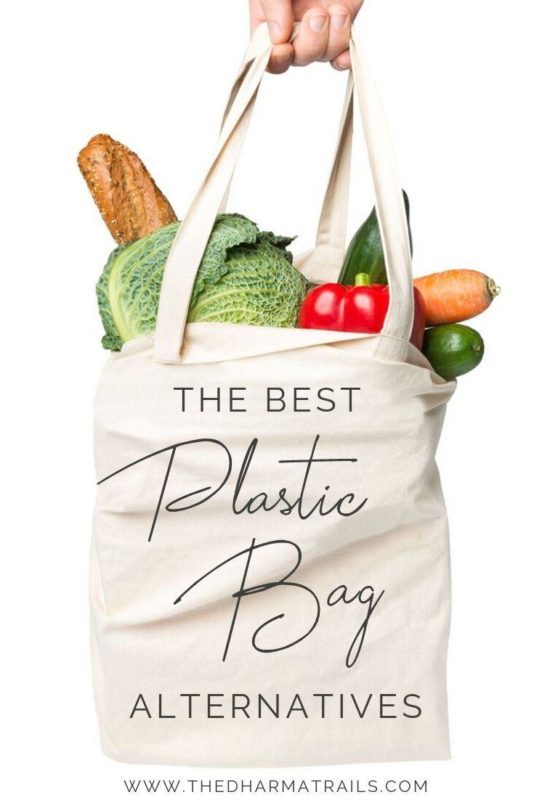
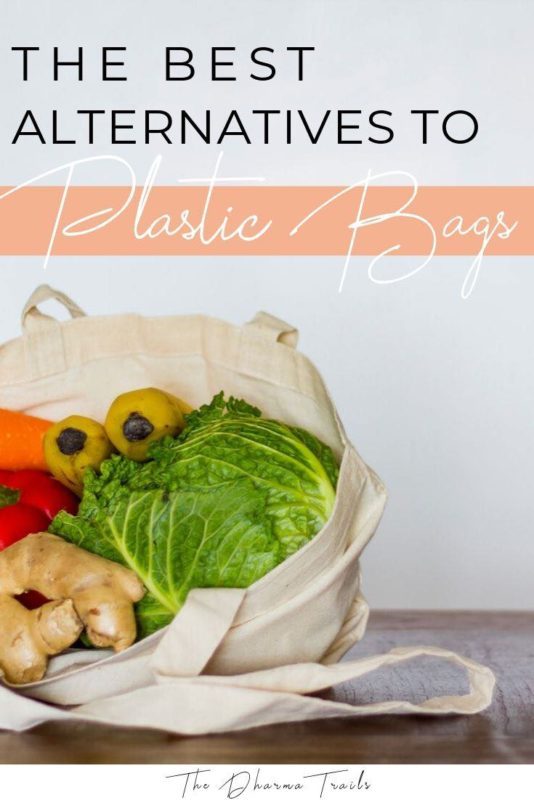

Aaron is one of the co-founders of The Dharma Trails. His background in marine eco tourism and writing have blended together to create the eco travel platform read by users around the world.

